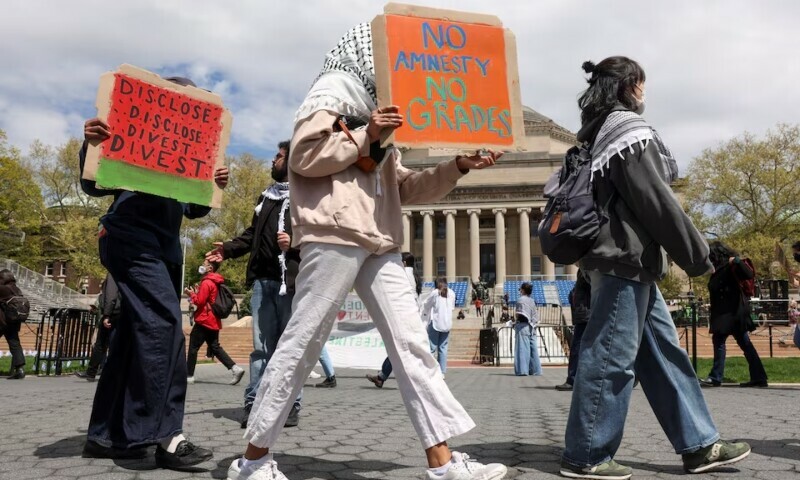
The party’s plans include a binding veto for Holyrood over devolved issues and the power to join international arrangements like the Erasmus scheme.
Labour is also looking at replacing the House of Lords with an elected “assembly of the nations and regions”.
Sir Keir Starmer said they would give the nations a “louder, prouder voice”.
But the SNP described the package of measures as “underwhelming”.
The proposals were launched at an event in Leeds, followed by another event in Edinburgh on Monday afternoon.
They include plans to spread power across the nations of the UK as well as to English regions and local mayors, in what Sir Keir called the “biggest ever transfer of power from Westminster to the British people”.
The paper – titled A New Britain – says Labour in government would offer “economic, social and constitutional innovations that can make the UK work better for the Scottish people”.
This would include a “legally binding” replacement for the Sewel convention, which states that Westminster would not normally legislate across devolved areas without the express consent of MSPs.
This happened a number of times as Brexit legislation was passing through the Commons, and Labour said this “disregarded the conventions which govern the exercise of power”.
The paper also proposes giving the Scottish Parliament some powers over foreign affairs, so that Scotland could sign up to international groups or agreements within devolved areas – such as the EU’s Erasmus student exchange scheme.
And it says there would be a consultation on increasing Holyrood’s borrowing powers.
Mr Brown told BBC Scotland: “I want the United Kingdom to work for Scotland and Scottish people.
“I want to see a change in the United Kingdom that makes it more attractive for Scottish people to support it and I believe we have come forward with measures to do so.”
The ex-Labour leader also wants to see greater co-operation between governments to deal with shared problems such as pandemics and pollution.
Mr Brown said he wanted to see “new job creating clusters” developing in Scotland in areas such as precision medicine in Glasgow and the video games industry in Dundee.
The former prime minister called for an overhaul of the Lords, which he said was “the biggest second chamber outside of China.”
Other reforms could see a new Council of the United Kingdom, to be chaired by the prime minister, which would replace the existing Joint Ministerial Committee system as a way of bringing together ministers from the UK’s devolved administrations.
Another recommendation is for Scotland to be represented on key UK national bodies, such as the Foreign and Commonwealth Office, Department for Transport, Bank of England and the energy regulator Ofgem.
Scottish politics has become heavily polarised since the independence referendum in 2014, much to the Labour Party’s disadvantage.
This once dominant force has been squeezed into third place – with “yes” voters typically backing the SNP and “no” voters tending more towards the Conservatives than Labour, in defence of the union.
Gordon Brown is attempting to reset the debate with a package of UK-wide reforms that include some further devolution of power to Scotland and a bigger voice for Scotland in the UK and internationally.
These proposals will inevitably be considered too vague and weak by some independence supporters and as a misguided attempt to appease nationalists by some supporters of the union.
Labour’s hope is that instead of failing to please voters on either side of the debate, change within the UK could become a popular alternative to either independence or keeping the UK as it currently operates.

Meanwhile, “thousands” of civil service jobs could be transferred from London to Scotland, with responsibility for job centres to be devolved to a local level.
Taken together Mr Brown said the package “could be more attractive than independence for Scotland”.
The UK Supreme Court last month ruled that Holyrood cannot stage a second independence ballot without Westminster’s go ahead.
The SNP has said it could use the next general election as a single-issue campaign on independence, but Mr Brown said his party would be offering “change within Britain rather than change by leaving Britain”.
He said: “It may be that the SNP will have a one-line manifesto and want a one-issue general election. But we have done a huge amount of research on Scottish public opinion, and people want a better health service immediately, people want living standards improved immediately, people want jobs for young people immediately, people want better housing immediately, and people want change in the way we are suggesting immediately.
“That is going to be the issue on which we fight – we are offering a plan for economic, social, political and constitutional reform, not a one issue election.”
‘Underwhelming reform plan’
But SNP deputy leader Keith Brown dismissed Labour’s blueprint for change.
He said: “After bigging up this report for months and months, this is yet another underwhelming constitutional reform plan from the Labour Party full of vague platitudes, empty promises, and what feels like the 10,000th time they have committed to reform the House of Lords.
“Ironically, a report which claims to be about strengthening devolution in many cases actually looks set to undermine it.”
He described Labour as a “pro-Brexit party with a pro-Brexit leader”.
Mr Brown added: “Through independence, Scotland can build a genuine partnership of equals with other nations across these islands – not only protecting the existing powers of the Scottish Parliament, but allowing us to escape the failing, Brexit-based, UK economic model and build a fairer, more prosperous and sustainable Scotland.”






